Sensor Sweep: World of Warcraft, Libertycon, Lin Carter
Monday , 20, June 2022 Sensor Sweep 1 CommentGaming (Bounding Into Comics): In their latest effort to try and rehabilitate their public image, Blizzard Entertainment has introduced a new anti-harassment “Social Contract” which World of Warcraft players must agree to before logging into the game. As reported by 80Lv, players are presented with the agreement upon their first log-in to the game following the May 31st rollout of its 9.2.5 patch.
their public image, Blizzard Entertainment has introduced a new anti-harassment “Social Contract” which World of Warcraft players must agree to before logging into the game. As reported by 80Lv, players are presented with the agreement upon their first log-in to the game following the May 31st rollout of its 9.2.5 patch.
Fantasy (John C. Wright): The issue Martin ran into with ASOIAF [A Song of Ice and Fire] is, ironically, one of this own hand… he spent five books subverting expectations, killing key characters, torturing and scattering the survivors to the ends of creation.
Conan (Sprague de Camp Fan): “Red Moon of Zembabwei” by L. Sprague de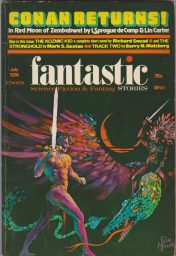 Camp and Lin Carter was first published in Fantastic, July 1974. It is the third story in Conan of Aquilonia, Prestige Books (distributed by Ace Books), 1977. The cover and interior art is by Ron Miller. Born May 8, 1947.
Camp and Lin Carter was first published in Fantastic, July 1974. It is the third story in Conan of Aquilonia, Prestige Books (distributed by Ace Books), 1977. The cover and interior art is by Ron Miller. Born May 8, 1947.
S-F Conventions (Bayou Renaissance Man): Libertycon has begun, with people streaming in from across the country (and a few from around the world) for the occasion. I didn’t make it to the opening ceremony yesterday afternoon, because by the time I got there all the seats within sight had been taken. With my wonky back, and using a cane as I do, I wasn’t about to stand through an hour-long opening, so I adjourned to a place with a seat and relaxed.
Tolkien (Notion Club Papers): There is a brief yet marvelous conversation in The Lord of the Rings, when Legolas and Gimli walk together through Minas Tirith and talk of the race of Men. ** ‘We will come’, said Imrahil; and they parted with courteous words. ‘That is a fair lord and a great captain of men,’ said Legolas.
D&D (Monsters and Manuals): Human beings like role playing, and will do it even with purportedly abstract games, or when on their own. Nobody who has ever played a video or board game can fail to notice that as soon as there is some character or item with which one can personally identify, people begin to act in accordance with that particular ‘role’ and to a certain extent assume it psychologically (if only for the duration of playing the game).
Fantasy (Cobalt Jade): The Chronicles of Prydain is a much-loved children’s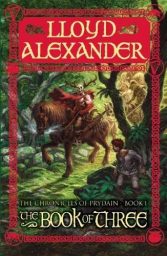 book series originally published in the 1960s. It consists of five books that follow the adventures of Taran, an orphan growing up on a farm with a wizard, a retired warrior, and a magic pig, Hen Wen, whom he cares for as “Assistant Pig-keeper.” In many ways, it’s an American analog to the Narnia series, but without Christianity, and a school-age analog to Tolkien, but based on Welsh myth including The Mabinogian.
book series originally published in the 1960s. It consists of five books that follow the adventures of Taran, an orphan growing up on a farm with a wizard, a retired warrior, and a magic pig, Hen Wen, whom he cares for as “Assistant Pig-keeper.” In many ways, it’s an American analog to the Narnia series, but without Christianity, and a school-age analog to Tolkien, but based on Welsh myth including The Mabinogian.
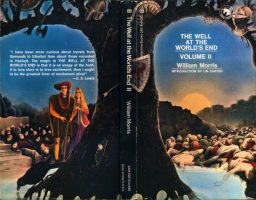 Fantasy (With Both Hands): Sometimes, I read books so you don’t have to. The Well at World’s End really is a seminal work, but it is also a slog of a book that I wouldn’t recommend to someone reading for fun. But it is a fascinating story, and the prototype of the generic medieval setting that has become the standard for mythic fiction post D&D.
Fantasy (With Both Hands): Sometimes, I read books so you don’t have to. The Well at World’s End really is a seminal work, but it is also a slog of a book that I wouldn’t recommend to someone reading for fun. But it is a fascinating story, and the prototype of the generic medieval setting that has become the standard for mythic fiction post D&D.
Following With Both Hands editorial policy, I intend to fully spoil this book, but as it was published 126 years ago and it is a bit of challenge to get through, I think this is for the best.
D&D (Necropraxis): The founding myth of the OSR, that it is based either in an original play style or in the Gygaxian style, … My view is that many of the communities, past or present, which identify with the “OSR” are based on that myth despite it being inconsistent with the multi-various ways in which hobbyists played in the 70s and 80s, as well as with the specific vision of D&D which Gygax propagated.
Writers (DMR Books): Hello readers. My name is Ken Lizzi, writer of two- fisted fabulism, lawyer, husband, and father, aficionado of that glorious marriage of hops and barley. I’ve been writing stories for as long as I can remember. It wasn’t until the early 2000s, however, that I began to seriously apply myself.
fisted fabulism, lawyer, husband, and father, aficionado of that glorious marriage of hops and barley. I’ve been writing stories for as long as I can remember. It wasn’t until the early 2000s, however, that I began to seriously apply myself.
 Fantasy (Goodman Games): Linwood Vrooman Carter was born on June 9th, 1930 in St. Petersburg, Florida. In the august company of his fellow Appendix N authors, Lin Carter is a figure both of high esteem and some controversy. As an editor and critic, he is indispensable, most notably for his role in editing the landmark Ballantine Adult Fantasy series (BAFS), which ran from 1969-1974 and re-introduced such luminaries as Lord Dunsany, William Hope Hodgson, and Clark Ashton Smith to the fantasy-reading public.
Fantasy (Goodman Games): Linwood Vrooman Carter was born on June 9th, 1930 in St. Petersburg, Florida. In the august company of his fellow Appendix N authors, Lin Carter is a figure both of high esteem and some controversy. As an editor and critic, he is indispensable, most notably for his role in editing the landmark Ballantine Adult Fantasy series (BAFS), which ran from 1969-1974 and re-introduced such luminaries as Lord Dunsany, William Hope Hodgson, and Clark Ashton Smith to the fantasy-reading public.
Review (DMR Books): The short review: This volume can stand alongside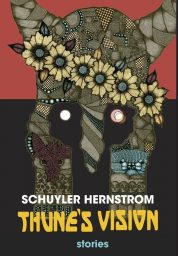 most sword-and-sorcery/sword-and-planet published during the heyday of the 1960s and ‘70s. That’s about the highest praise I can give it. Hernstrom is a new writer of note, and one that we who love this type of thing sorely need. His excellence cannot be boiled down to a single pithy line, but here are a few things I enjoy about his writing:
most sword-and-sorcery/sword-and-planet published during the heyday of the 1960s and ‘70s. That’s about the highest praise I can give it. Hernstrom is a new writer of note, and one that we who love this type of thing sorely need. His excellence cannot be boiled down to a single pithy line, but here are a few things I enjoy about his writing:
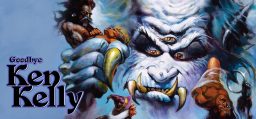 Art (Goodman Games): It is with sadness that we note the passing of fantasy artist Ken Kelly (May 19, 1946 – June 3, 2022). Any fan of fantasy fiction for the last half-century will recognize Ken’s dynamic compositions and his characters throbbing with barely contained energy — work that threatens to burst off the covers of dozens upon dozens of paperback books, many of which are no doubt on your very bookshelf. Perhaps this is no surprise when you consider that Frank Frazetta was an early mentor of Ken’s.
Art (Goodman Games): It is with sadness that we note the passing of fantasy artist Ken Kelly (May 19, 1946 – June 3, 2022). Any fan of fantasy fiction for the last half-century will recognize Ken’s dynamic compositions and his characters throbbing with barely contained energy — work that threatens to burst off the covers of dozens upon dozens of paperback books, many of which are no doubt on your very bookshelf. Perhaps this is no surprise when you consider that Frank Frazetta was an early mentor of Ken’s.
Science Fiction (Dark Roasted Blend): Here the Binder Brothers take the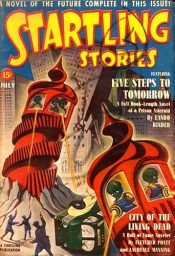 Alexander Dumas’ classic “The Count of Monte Cristo” plot and set it in space (featuring a huge prison satellite and enough intrigues to feed a crazed imagination of, say, a Cold-War era KGB counter-espionage unit). The “Monte Cristo in Space” plot was later re-used by other science fiction writers, most notably by Alfred Bester in his “Tiger, Tiger”. “Five Steps To Tomorrow” is an impressive effort for 1940.
Alexander Dumas’ classic “The Count of Monte Cristo” plot and set it in space (featuring a huge prison satellite and enough intrigues to feed a crazed imagination of, say, a Cold-War era KGB counter-espionage unit). The “Monte Cristo in Space” plot was later re-used by other science fiction writers, most notably by Alfred Bester in his “Tiger, Tiger”. “Five Steps To Tomorrow” is an impressive effort for 1940.
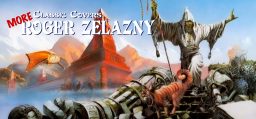 Art (Goodman Games): Multiple-award-winning and best-selling author Roger Zelazny’s popularity wasn’t just confined to his native United States. Winner of France’s Prix Apollo, translated into dozens of languages, Zelazny’s reach was international and his appeal universal. While many of us will only ever appreciate him in one language, the multitude of artistic interpretations of his highly imaginative stories is something we can all enjoy with yet more Classic Covers.
Art (Goodman Games): Multiple-award-winning and best-selling author Roger Zelazny’s popularity wasn’t just confined to his native United States. Winner of France’s Prix Apollo, translated into dozens of languages, Zelazny’s reach was international and his appeal universal. While many of us will only ever appreciate him in one language, the multitude of artistic interpretations of his highly imaginative stories is something we can all enjoy with yet more Classic Covers.
RPG (False Machine): Seems like there should be a lot more cattle raiding in both fantasy and gaming. Its absolute bedrock for the Indo-European tradition and has carried over all the way from the steppe to a few centuries ago. But when have I seen a D&D module or adventure or a computer game, or even a scene in a fantasy novel where “Hey we have to do a cattle raid. Partly to re-enact the core of our ancient creation myth but also just to steal cows.” – NEVER. Not once.
History (James LaFond): “The sovereign of the Russian deserts [Czar] commands a greater portion of the globe,” and a comparison of the extent of Alexander’s and the Mongols’ conquests is contrasted in their emptiness and fleeting state with the long rule and stability of Rome, which ruled the Middle Sea—that perennial object of prosperity—from 100 B.C. through A.D. 500, which blows away the combined reigns of the Mongols, Macedonians and Russian Czars, and “might almost induce us to forgive the vanity or ignorance of the ancients.”
Cinema (Bounding Into Comics): Terror on the Prairie was announced, featuring Carano starring in what looked to be a gritty Western piece reminiscent of films like Unforgiven, Tombstone, and Bone Tomahawk. Fans of that last film will find a lot to like about Terror on the Prairie, as both share the same sense of authenticity and ruggedness.
featuring Carano starring in what looked to be a gritty Western piece reminiscent of films like Unforgiven, Tombstone, and Bone Tomahawk. Fans of that last film will find a lot to like about Terror on the Prairie, as both share the same sense of authenticity and ruggedness.
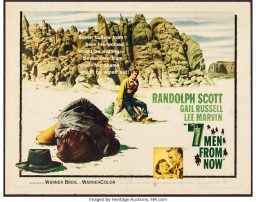 Cinema (Collection Review): The first of seven Westerns Boetticher made with Randolph Scott. As much as I love most of them (The Tall T and Ride Lonesome are two of the best Westerns), 7 Men from Now is a disappointment on rewatching. Scott is great as a man hunting the seven men responsible for his wife’s death. Lee Marvin is very good as a man of unclear loyalties. As is true of all these movies, it’s tight and economical, but unlike the others, it’s saddled with a soggy love story and a poor score.
Cinema (Collection Review): The first of seven Westerns Boetticher made with Randolph Scott. As much as I love most of them (The Tall T and Ride Lonesome are two of the best Westerns), 7 Men from Now is a disappointment on rewatching. Scott is great as a man hunting the seven men responsible for his wife’s death. Lee Marvin is very good as a man of unclear loyalties. As is true of all these movies, it’s tight and economical, but unlike the others, it’s saddled with a soggy love story and a poor score.
Cinema (Neotextcorp): After a string of successes on television, having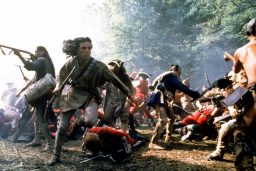 made a name for himself on projects such as Starsky and Hutch and Police Story, Michael Mann turned to directing films. The TV movie called The Jericho Mile won three Emmy awards and opened the gateway to Hollywood; Thief, The Keep and Manhunter followed, turning Mann into one of the more interesting filmmakers out there. What the director chose to do next, however, was somewhat surprising. “The idea for The Last of the Mohicans came to me because I’d seen the film written by Philip Dunne when I was 3.
made a name for himself on projects such as Starsky and Hutch and Police Story, Michael Mann turned to directing films. The TV movie called The Jericho Mile won three Emmy awards and opened the gateway to Hollywood; Thief, The Keep and Manhunter followed, turning Mann into one of the more interesting filmmakers out there. What the director chose to do next, however, was somewhat surprising. “The idea for The Last of the Mohicans came to me because I’d seen the film written by Philip Dunne when I was 3.
Last of the Mohicans is absolutely epic. It’s a classic.